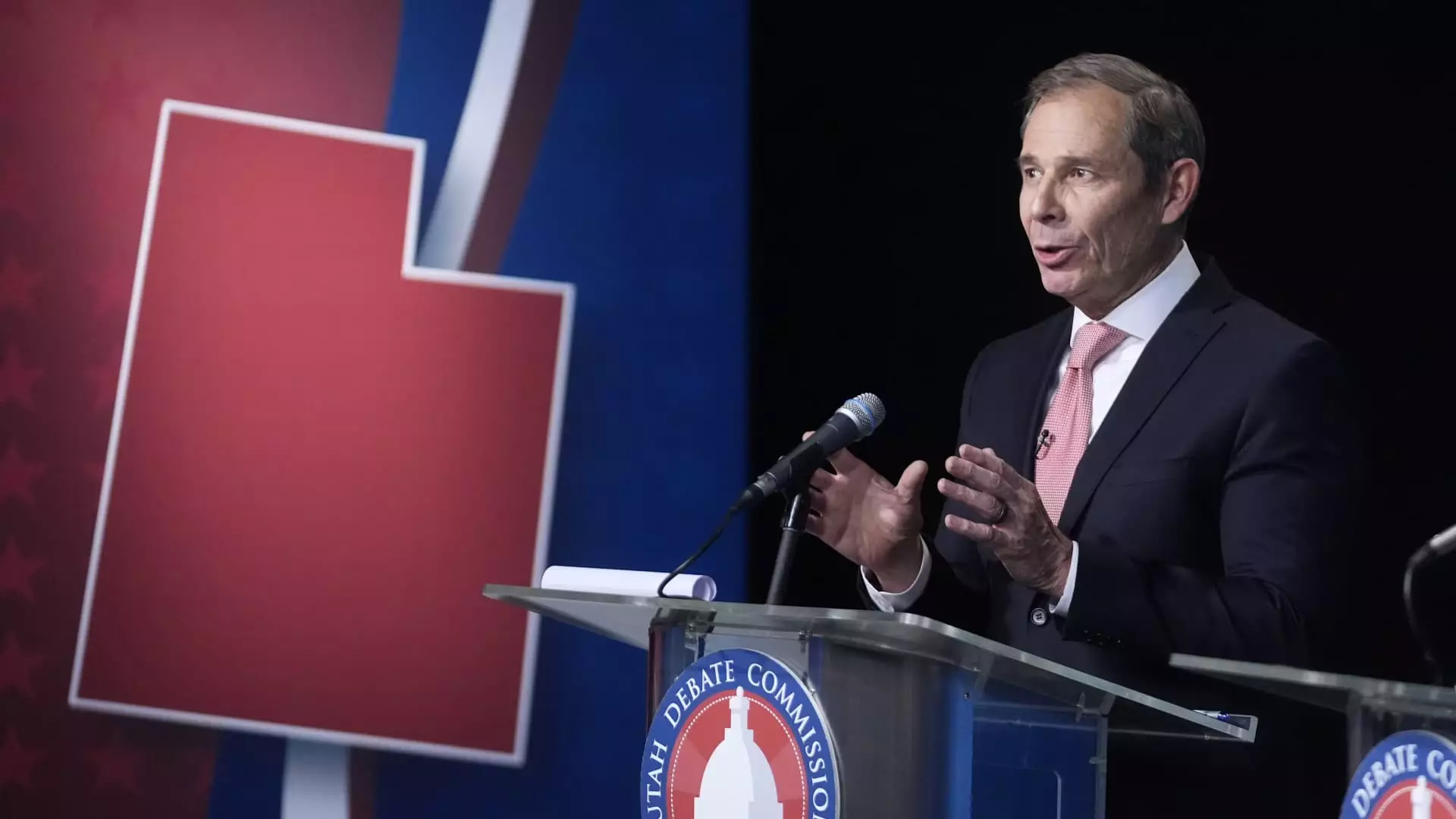In the midst of a rapidly evolving digital landscape, certain political figures have emerged as champions for the cryptocurrency sector. One such figure is John Curtis, a Republican congressman from Utah, who is actively campaigning for the Senate seat soon to be vacated by Mitt Romney. His reception within the crypto industry is nothing short of enthusiastic, primarily due to his unique experiences and perspective that resonate with crypto enthusiasts.
Curtis’s political journey is marked by an interesting transition from telecommunications to the web of digital currencies. During a recent event at the Permissionless Conference in Salt Lake City, Curtis shared an anecdote highlighting lawmakers’ disconnect from real-world internet usage. The congressman recounted a discussion with fellow legislators regarding boosting internet service offerings where ignorant responses to his question about speed tests left him astounded. This experience ignited his realization of the necessity for lawmakers to engage deeply with technology and its implications on society.
The Need for Informed Regulation
Curtis emphasized the importance of understanding user experiences when legislating around innovative sectors such as cryptocurrency. “If lawmakers do not grasp what businesses are accomplishing, they’re likely to implement misguided regulations,” he asserted. This perspective is one that he hopes to instill within the halls of Congress. As Curtis stands on the brink of potentially winning the Senate seat, his seemingly pro-crypto platform has translated into significant financial support from within the industry.
The backing Curtis receives comes from political action committees (PACs) dedicated to cryptocurrency and blockchain policies, demonstrating an active engagement from an industry keen on influencing legislative outcomes. Notably, the Defend American Jobs PAC has channeled an impressive $1.9 million to Curtis’s campaign, a testament to the alignment of his interests with the ambitions of the crypto community.
Financial Commitments from the Crypto Sector
As the crypto industry gains traction in political discussions, its influence on election funding is becoming increasingly evident. To date, nearly half of corporate donations during this election cycle have been directed towards candidates who openly endorse cryptocurrency. Yes, the Defend American Jobs PAC isn’t alone in its support; various crypto-backed PACs have demonstrated the capacity to sway elections. Out of 42 candidates that received backing from crypto-centric super PACs, 36 emerged victoriously during the primaries. The sheer volume of over $130 million spent in congressional races is a clear indication of how the crypto sector aims to secure favorable regulatory environments.
In recent findings by the venture firm Andreessen Horowitz, it was noted that more than 40 million Americans engage in cryptocurrency ownership, with a majority expressing intent to support pro-crypto candidates. This burgeoning demographic comprises young, diverse voters who are increasingly vocal about their political preferences. Curtis advocates for a self-regulated crypto industry to present well-prepared proposals to lawmakers, aiming to frame a balance between innovation and necessary safeguards against malpractices.
The momentum generated by crypto PAC contributions extends beyond Curtis’s campaign, signaling a broad strategy by the crypto sector to impact crucial Senate and House races across the United States. Notably, substantial funds have been funneled towards candidates in states like Arizona, Michigan, and Ohio. For example, the Protect Progress PAC has strategically invested in Senate campaigns, backing candidates who align with the crypto agenda while aiming to unseat those like Elizabeth Warren, known for her stringent views against digital currencies.
Among the notable targets is Ohio Democrat Sherrod Brown, head of the Senate Banking Committee, who has faced a barrage of financial opposition from crypto ecosystems eager to facilitate a favorable environment for cryptocurrency growth. The stakes are high, as the outcomes of these races could significantly determine which party controls the Senate, further influencing the trajectory of cryptocurrency legislation at the national level.
As representatives like Curtis champion crypto-friendly policies, the political landscape surrounding cryptocurrency may gradually shift from pervasive distrust towards a more informed and constructive dialogue. Tom Emmer, House Majority Whip, aptly noted that discussions surrounding digital assets should transcend traditional party lines, marking a significant moment for bipartisan cooperation in governance.
John Curtis’s rise as a preferred candidate of the cryptocurrency community may symbolize a future wherein lawmakers prioritize education and user experience over instinctively restrictive measures. For the crypto industry, this representation presents a pathway to continued growth and innovation, standing to benefit not only from financial contributions but also from an increasingly supportive regulatory climate rooted in understanding and collaboration. As we navigate this evolving milieu, the potential for a harmonious relationship between crypto advancements and mainstream politics appears promising.

